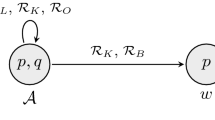Abstract
In epistemic logic, some axioms dealing with the notion of knowledge are rather convoluted and difficult to interpret intuitively, even though some of them, such as the axioms .2 and .3, are considered to be key axioms by some epistemic logicians. We show that they can be characterized in terms of understandable interaction axioms relating knowledge and belief or knowledge and conditional belief. In order to show it, we first sketch a theory dealing with the characterization of axioms in terms of interaction axioms in modal logic. We then apply the main results and methods of this theory to obtain specific results related to epistemic and doxastic logics.
Similar content being viewed by others
References
Adams, E., The Logic of Conditionals, vol. 86 of Synthese Library, Springer, Dordrecht, 1975.
Aucher, G., Axioms .2 and .4 as interaction axioms, in C. Baral, G. De Giacomo, and T. Eiter, (eds.), Principles of Knowledge Representation and Reasoning: Proceedings of the Fourteenth International Conference, KR 2014, Vienna, Austria, July 20–24, 2014, AAAI Press, Palo Alto, 2014.
Aucher, G., Interdisciplinary Works in Logic, Epistemology, Psychology and Linguistics, vol. 3 of Logic, Argumentation and Reasoning, Chap. Principles of knowledge, belief and conditional belief, Springer, Heidelberg, 2014.
Baltag A., Smets S.: Conditional doxastic models: A qualitative approach to dynamic belief revision. Electronic Notes in Theoretical Computer Science 165, 5–21 (2006)
Baltag, A., and S. Smets, Texts in Logic and Games, vol. 4, Chap. The logic of conditional doxastic actions, Amsterdam University Press, Amsterdam, 2008, pp. 9–31.
Baltag, A., and S. Smets, Texts in Logic and Games, vol. 3, Chap. A qualitative theory of dynamic interactive belief revision, Amsterdam University Press, Amsterdam, 2008, pp. 9–58.
Blackburn, P., M. de Rijke, and Y. Venema, Modal Logic, vol. 53 of Cambridge Tracts in Computer Science, Cambridge University Press, Cambridge, 2001.
Board O.: Dynamic interactive epistemology. Games and Economic Behavior 49, 49–80 (2004)
Dubois, D., and H. Prade, Possibilistic logic, preferential model and related issue, in Proceedings of the 12th International Conference on Artificial Intelligence (IJCAI), Morgan Kaufman, San Mateo, 1991, pp. 419–425.
Fagin R., Halpern J., Moses Y., Vardi M.: Reasoning about Knowledge. MIT Press, Cambridge (1995)
Floridi L.: The logic of being informed. Logique et Analyse 49(196), 433–460 (2006)
Friedman N., Halpern J.Y.: Modeling belief in dynamic systems, part I: Foundations. Artificial Intelligence 95(2), 257–316 (1997)
Friedman N., Halpern J.Y.: Plausibility measures and default reasoning. Journal of the ACM 48(4), 648–685 (2001)
Gabbay, D.M., A. Kurucz, F. Wolter, and M. Zakharyaschev, Multi-dimensional Modal Logic: Theory and Application, vol. 148 of Studies in Logic and the Foundations of Mathematics, Elsevier, Amsterdam, 1998.
Halpern J.Y.: Should knowledge entail belief?. Journal of Philosophical Logic 25(5), 483–494 (1996)
Halpern J.Y., Samet D., Segev E.: Defining knowledge in terms of belief: the modal logic perspective. The Review of Symbolic Logic 2, 469–487 (2009)
Halpern J.Y., Samet D., Segev E.: On definability in multimodal logic. The Review of Symbolic Logic 2, 451–468 (2009)
Hintikka J.: Knowledge and Belief, An Introduction to the Logic of the Two Notions,. Cornell University Press, Ithaca (1962)
Kraus, S., and D. Lehmann, Knowledge, belief and time, in L. Kott, (eds.), Automata, Languages and Programming, vol. 226 of Lecture Notes in Computer Science, Springer, Berlin, 1986, pp. 186–195.
Kraus, S., D.J. Lehmann, and M. Magidor, Nonmonotonic reasoning, preferential models and cumulative logics, Artificial Intelligence 44(1–2):167–207, 1990.
Lamarre, P., and Y. Shoham, Knowledge, certainty, belief, and conditionalisation (abbreviated version), in KR, 1994, pp. 415–424.
Lehrer K., Paxson T.: Knowledge: undefeated justified true belief. The Journal of Philosophy 66, 225–237 (1969)
Lenzen W., Recent Work in Epistemic Logic, Acta Philosophica Fennica 30, North Holland Publishing Company, Amsterdam, 1978.
Lenzen W.: Epistemologische betractungen zu [S4;S5]. Erkenntnis 14, 33–56 (1979)
Marx M., Venema Y.: Multi-dimensional Modal Logic. Springer, Dordrecht (1997)
Meyer J.-J.C., van der Hoek W.: Epistemic Logic for AI and Computer Science. Cambridge University Press, Cambridge (1995)
Moses Y., Shoham Y.: Belief as defeasible knowledge. Artificial intelligence 64(2), 299–321 (1993)
Shoham Y., Leyton-Brown K.: Multiagent Systems: Algorithmic, Game-Theoretic, and Logical Foundations. Cambridge University Press, Cambridge (2009)
Spohn, W., A general non-probabilistic theory of inductive reasoning, in R.D. Shachter, T.S. Levitt, L.N. Kanal, and J.F. Lemmer, (eds.), UAI, North-Holland, Amsterdam, 1988, pp. 149–158.
Spohn, W., Ordinal conditional functions: a dynamic theory of epistemic states, in W.L. Harper and B. Skyrms, (eds.), Causation in Decision, Belief Change, and Statistics, vol. 2, Reidel, Dordrecht, 1988, pp. 105–134.
Stalnaker R.: On logics of knowledge and belief. Philosophical Studies 128, 169–199 (2006)
van der Hoek W.: Systems for knowledge and belief. Journal of Logic and Computation 3(2), 173–195 (1993)
von Kutschera, F., Einführung in die intensional Semantik, W. de Gruyter, Berlin, 1976.
Voorbraak, F., As Far as I know. Epistemic Logic and Uncertainty, PhD thesis, Utrecht University, 1993.
Author information
Authors and Affiliations
Corresponding author
Additional information
A short version of this article appears in [2]. This short version only deals with axioms .2 and .4 and does not deal with conditional beliefs.
Rights and permissions
About this article
Cite this article
Aucher, G. Intricate Axioms as Interaction Axioms. Stud Logica 103, 1035–1062 (2015). https://doi.org/10.1007/s11225-015-9609-0
Received:
Published:
Issue Date:
DOI: https://doi.org/10.1007/s11225-015-9609-0




